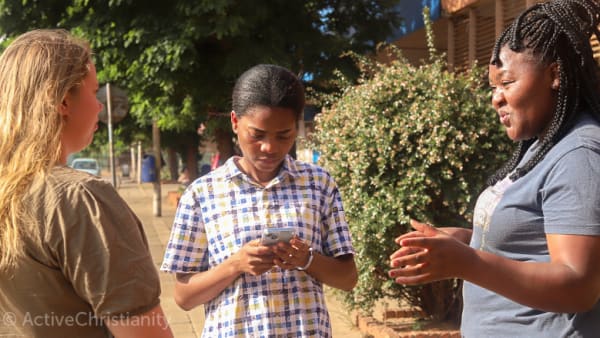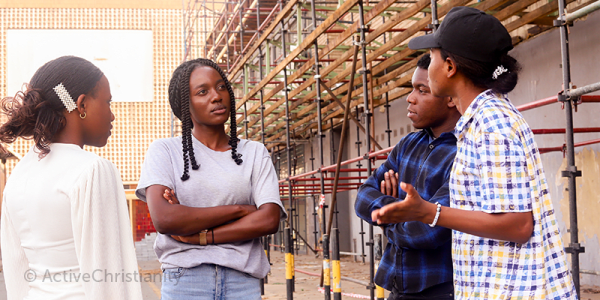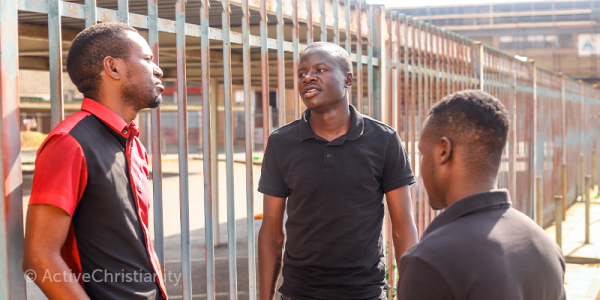It can already be difficult to forgive people when they say sorry.
The hurtful or thoughtless things people say and do can over and over come up in my thoughts when I am feeling tired, or low or sorry for myself. But if they say sorry, then I know I should forgive them because at least they have humbled themselves. And more importantly, because Jesus said so: “If he sins against you seven times in one day and says that he is sorry each time, forgive him.” Luke 17:4 (NCV).
But what if they don’t think they have said or done anything wrong? Or, what if they know, but don’t care? Maybe I can manage to forgive people when they say sorry, but my human reasoning tells me that people who don’t want forgiveness don’t deserve forgiveness.
But here are six very good reasons to forgive someone who isn't sorry.
1. God tells me to forgive
I read in 1 Peter 3:8-9 (CJB) that I should “… be compassionate and humble-minded, not repaying evil with evil or insult with insult, but, on the contrary, with blessing. For it is to this that you have been called, so that you may receive a blessing.”
I shouldn’t only forgive when others are sorry. If they are not sorry, God still tells me to forgive. This is a commandment. What’s more, if I don’t forgive then God cannot forgive me, even if I repent. “But if you do not let men have forgiveness for their sins, you will not have forgiveness from your Father for your sins.” Matthew 6:15 (BBE). It really is that serious.
2. Jesus gave me an example when dying on the cross
One of the last things Jesus did before He died was to make sure He forgave the people who murdered Him: “Father, forgive them, for they do not know what they do.” Luke 23:34.
And we are called to be like Him. Disciples take this seriously.
3. So my life isn’t ruined by bitterness and anger
What good can I do if my thoughts are bitter and angry? God can’t use me. God can’t bless me. Bitterness affects my thoughts and my spirit. It makes me unhappy and impure. This is totally my own responsibility, and not the responsibility of the person who has done something wrong to me.
“Make every effort to live in peace with everyone and to be holy; without holiness no one will see the Lord. See to it that no one falls short of the grace of God and that no bitter root grows up to cause trouble and defile (ruin) many.” Hebrews 12:14-15 (NIV).
4. Forgiveness gives me power in my spirit
It says in 1 Timothy 6:11 (CEB), “But as for you … run away from all these things. Instead, pursue [run after] righteousness, holy living, faithfulness, love, endurance, and gentleness.”
When I do this then I learn to know good from evil. (Hebrews 5:12-14.) That’s how I learn. I come into situations and go to God’s Word to find out what I should do, because my own reasoning and sense of what is good, is wrong. It’s wrong because my whole human nature is polluted by sin. Sometimes it hides itself so well that I don’t even see it. But it is there, and I have to ask God to show me, I have to admit it, and reject it. This way of life gives me power in my spirit and is a victory of good over evil. I do what’s written in God’s Word instead of living by my human reasoning. (2 Corinthians 2:14.)
5. Most people don’t understand the importance of what they say and do
If people understood that what they say and do affects their relationship with God, and that it affects their happiness for all eternity, then they would probably try hard to be better, kinder, more loving people. They would ask God for help to live in a better way. But most people don’t have that relationship with God and only think about their future on earth, not about eternity. I have to forgive them because, as Jesus said, they do not know what they do…
6. Because I’m guilty too
I am a human being who can also upset and offend other people. If I have not knowingly said or done anything to offend other people, then I may have a clean conscience and not feel guilty, but that does not mean that I have not upset someone by something I accidentally said (or didn’t say). I have no idea what people think of me, of how I really affect others, of mistakes I have made without being aware. Jesus said, “The one of you who is without sin, let him be the first to throw a stone at her.…” John 8:7 (CJB).
I must not feel bitter towards people who don’t say sorry to me, or judge them, for I certainly also have things to say sorry for. Jesus tells us to judge ourselves, to examine our reasons why we do or say things and what is deep in our heart. When I do this, I can see how I myself need God’s forgiveness, and also the forgiveness of others. I’m not as blameless as I would like to think.
And no, it’s not easy to forgive. But the more I listen to God and read what He says in His Word, the more I understand how to react in a godly way; it becomes easier. I slowly lose my “human” way of thinking of what is right and wrong and come into God’s way of thinking, which is a life filled with warmth and power. I don’t have to judge or punish others for their wrongdoing; I can leave that to God.
And when I do leave it to God, I will come to perfect rest.




